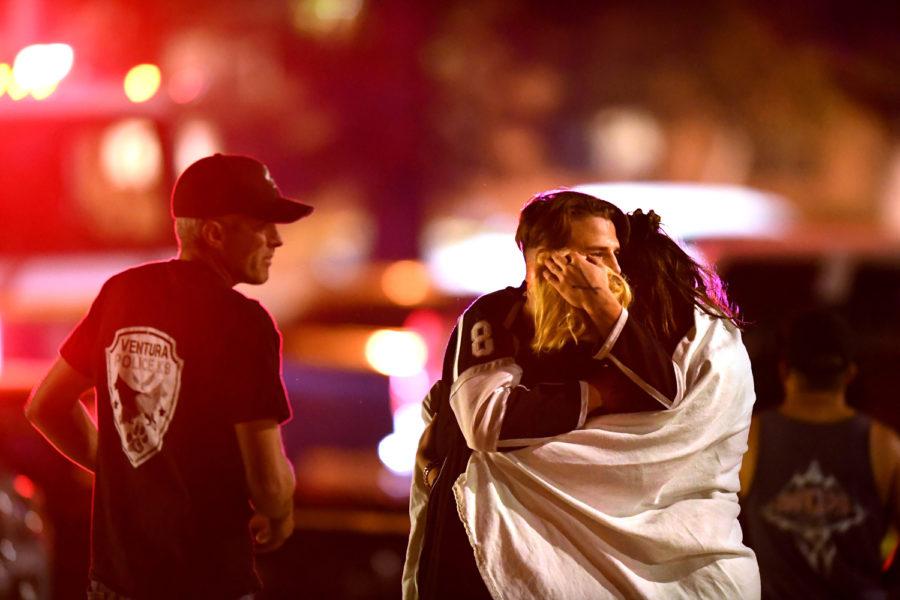Editorial: Remember mental health of shooting victims
Wally Skalij/Los Angeles Times/TNS
People comfort each other after the mass shooting at Borderline Bar & Grill.
November 12, 2018
It’s been only 16 days since the mass shooting at the Tree of Life Synagogue in Pittsburgh, and already the eyes of the nation are turned to the latest tragic shooting — the largest one in 16 days.
A U.S. Marines veteran armed with a legally obtained pistol allegedly entered the Borderline Bar & Grill in Thousand Oaks, California, on Wednesday and fatally shot 12 people, not including himself. Among the victims was Tel Orfanos, who survived the 2017 shooting at a music festival in Las Vegas in which 58 people were killed and 489 wounded.
Pittsburgh is still feeling the damage a mass shooting can have on a community. We’re tired of reading about it. We’re tired of writing about it. And we’re acutely aware, after having lived through it and after one person was a part of two of these events in the span of a year, that mass shootings have become a cultural problem that must be fixed.
There has been many conversations about the role of mental health in shootings. Mental health has not been a major topic of conversation following the Tree of Life shooting, but it seems the alleged shooter in California may have suffered from post-traumatic stress disorder from his five years with the Marines.
In a Facebook update posted around the time of the shooting, the alleged shooter wrote, “I hope people call me insane… [laughing emojis]… wouldn’t that just be a big ball of irony? Yeah… I’m insane, but the only thing you people do after these shootings is ‘hopes and prayers’.. or ‘keep you in my thoughts’… every time… and wonder why these keep happening.”
He shows an awareness of how people react to shootings that must stem from the fact they are cultural phenomena. He demonstrates a chilling disdain for the consequences of his actions and a flippancy toward mental disorders that underline the need for better mental health services for those who may suffer from PTSD.
Following a reported disturbance in the alleged shooter’s home in April, mental health specialists talked to him about the possibility of his having PTSD, but ultimately decided that he wasn’t a threat to himself or others and that he didn’t qualify to be detained by state law for evaluation and treatment.
And while we must discuss how mental health services can prevent future violence, this particular event brings to light the fact that we need adequate resources for survivors of mass shootings too. One of these ordeals is hard enough to process and deal with — but they’ve become commonplace to the point that more than one person at the bar in California has been through two of them.
According to the National Center for PTSD, about 28 percent of people who experience a mass shooting develop PTSD. Approximately a third of those people develop acute stress disorder, which can occur after traumatic events. The cruel irony is shooters who suffer from PTSD only add more trauma and stress into the world — and there needs to be adequate resources to deal with that.
California, Pittsburgh and the survivors of each shooting are just beginning their healing processes. But for those who survived both the shooting in Las Vegas and the shooting in California, this is the beginning of a lifelong process of healing and recovering from the trauma of living through two massacres just 402 days apart.



